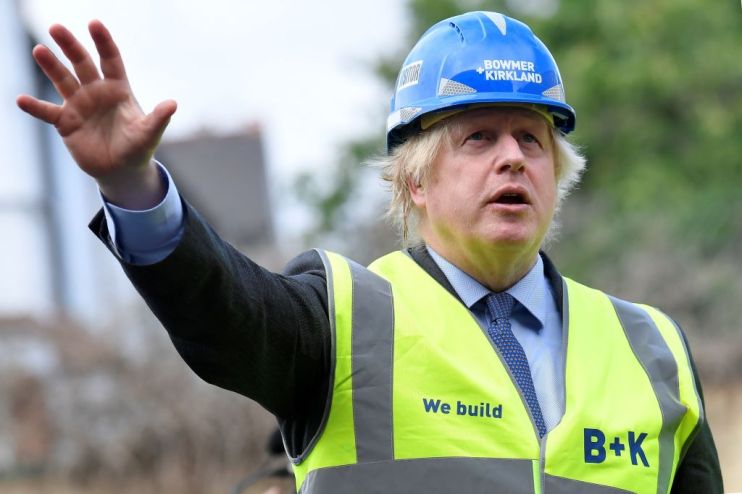Boris Johnson’s New Deal: PM invokes Roosevelt in ‘radical’ infrastructure overhaul

Boris Johnson has today set out plans to overhaul the UK’s planning system, to make building new homes easier, in order to fix what he termed “intergenerational injustices” in access to property.
The overhaul will allow developers to change the use of buildings and land in town centres without planning permission, meaning that vacant buildings and shops can be easily transformed into new homes.
This will also count for other kinds of properties, meaning a building that is used for retail could be transformed into a hospitality venue or office space without needing planning or local authority approval.
Pubs, libraries and some other shops will be among the type of buildings exempt from the changes to the UK planning system.
Property owners will also be able to build additional space above their properties through a fast-track approval system.
The Prime Minister called the changes “the most radical reforms of our planning system since the end of the second World War”.
Before the Open newsletter: Start your day with the City View podcast and key market data
“Decade after decade where we have failed to build enough homes,” he said.
“We will build fantastic new homes in brownfield sites and other areas.
“We will address that intergenerational injustice and help people get on the housing ladder in a way their parents and grandparents could.”
The government also unveiled a number of other measures to assist house building, such as a £12bn affordable homes programme that will build to 180,000 new homes and £400m of funding being allocated to build properties on brownfield sites in major northern hubs.
The new announcements came alongside a speech where Johnson laid out his vision to rebuild the UK after the coronavirus crisis and to “build, build, build”.
Johnson invoked former US President Franklin Roosevelt in the speech, saying that he wanted to set out a New Deal for the UK, and pledged not to return to austerity despite the government’s ballooning public debt.
The New Deal was a set of public spending programmes aimed at lifting the US out of the Great Depression in the 1930s.
Johnson committed the government to a number of spending commitments, most of which had already been outlined in the Conservatives’ election winning manifesto, while also promising £5bn in new spending.
He recommitted to build 40 new hospitals, hire 20,000 more police and spend large on infrastructure projects to “level up” the regions outside of London.
The govenrment also pledged on Sunday night to spend £1bn on a schools rebuilding programme to begin next year.
Johnson also confirmed a previous announcement that the UK would offer apprenticeships to all young people in the UK who wanted them.
The speech, in the West Midlands town of Dudley, committed the government to “double down on levelling up”.
“We must use this moment now, this interval, to plan our response and fix the problems that are most brutally illuminated in that Covid lightning flash,” Johnson said.
“This economic crisis is the moment to address the problems we have failed to tackle for decades, because it’s one of the most extraordinary feature of the UK, in many ways the greatest place on earth, that we tolerate such yawning gaps between the best and the rest.
“It is time not just for a new deal, but a fair deal for the British people.”
He also moved to assure the Tories’ more fiscal conservative supporters and MPs that the new programme was not too left-wing, by declaring: “I am not a communist.”
“I believe it is also the job of government to create the conditions for free market enterprise and yes we clap for our NHS, but under this government we also clap for those who make our NHS possible our innovators, our wealth creators, our capitalists and financiers.”
Responding to the UK planning changes, former president of the Royal Institution of Chartered Surveyors (RICS) Jeremy Leaf said: “While, of course, the announcement of more building is very welcome we want to see more specifics, not just on desperately-needed affordable housing projects but a strict timetable for delivery, especially of sites with planning.”